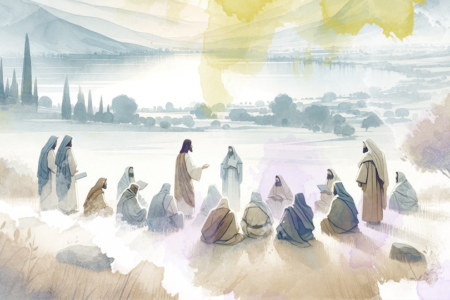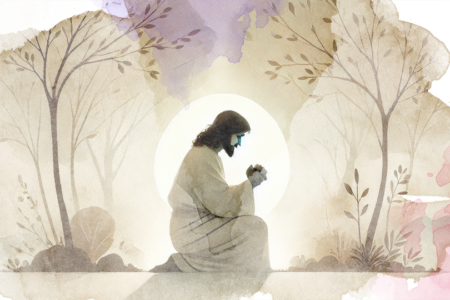The Prodigal’s Brother
The Prodigal Son is one of the best known and best loved parables. One cannot read it without being deeply moved. It has the ring of universal and eternal reality. Lives there a preacher who has not, at one time or another, preached a sermon based on the matchless parable of God’s yearning love and boundless forgiveness for the repentant sinner? The story is too well known to need retelling.
The relationship between the prodigal son and his law-abiding and home-staying brother, has sometimes been applied to the Jew in relation to his younger brother, the Gentile. At first glance this interpretation sounds attractive and feasible, yet on closer investigation it does not hold up. Biblically speaking, the Christless Gentile has never belonged to the household of faith, so he could not have left it.
We have also heard sermons in which “The Jew” was likened to “the Prodigal Son” who has left his Father’s home, when he strayed away from The Word of God and from the promised Messiah. In this interpretation “the elder brother” becomes the Gentile Christian who is unwilling to receive the lost Jew into the fellowship of Christ.
A look at the opening lines of Luke 15 immediately clarifies the real situation:
“Then drew near unto him all the publicans and sinners for to hear him. And the pharisees and scribes murmured, saying, This man receiveth sinners and eateth with them.” Luke 15:1-2
Our Lord was dealing with two groups of people; both of them were Jews. The first group was composed of publicans and sinners, who were eager to listen to the words of Jesus because of His compassionate interest in them. The second group were the Pharisees and Scribes, who murmured and pouted because “he receiveth sinners and eateth with them.” It was to these people, the publicans and the sinners, deeply aware of their sinful condition, and to the self-righteous, self-satisfied Pharisees and Scribes that our Lord addressed the three parables; about the lost sheep, the lost coin, and the lost son.
There is a common notion among most Christians that the Pharisees were all “a bunch of hypocrites.” The very word “Pharisee” has become synonymous with “hypocrite.” But not all Pharisees were necessarily hypocrites. True, there was always the temptation for the Pharisee so to rely on his minute observance of the Law, on his piety and zeal, as to become self- righteous, self-satisfied and smug. If, in addition, the Pharisee was also “a Scribe,” that is an expert in the Law of Moses and its interpretation, his self-esteem and the great respect for him by his community increased even more.
It was that kind of Pharisees that our Lord called “hypocrites.”
Yet basically, most Pharisees were not hypocrites—which in Greek means “play actors.” They were, as a rule, well-meaning but sometimes misguided men, who believed that by their strict observance of the Law and by going even beyond its demands they would please God. St. Paul, once a Pharisee himself, described them in this way: “They have a zeal for God, but not according to knowledge.”
The people who are mentioned in connection with the parable of “The Prodigal Son,” the publicans and the sinners as well as the Pharisees and the Scribes, are always with us, even in our own midst. They may be Jews, or they may be “Christians.” Race, nationality or creed has nothing to do with it. We all know them. We may even belong to them, without realizing it.
Usually, it is the younger brother, the Prodigal Son, who receives the most attention in our sermons and meditations. However, this time we shall let the elder brother, “The Unprodigal Son,” become the center of our interest.
What kind of a man was he? In a few masterful strokes, our Lord left us with his unforgettable portrait. And that which He left unsaid, He permits our imagination to complete.
The elder brother appears to have been, first of all, a dutiful and a plodding worker. His father could depend on him to carry out his daily chores well. He probably was “a solid citizen,” may be without too much imagination or great insight. He did what he was told to do and he was well satisfied with himself. Yet in one respect the older brother failed his father completely. He did not understand his father’s grief for his lost son, and was utterly insensitive to his father’s dearest hope, that one day his lost son would return home.
Oh, those sleepless nights, during which his father tossed in his bed, thinking, hoping, praying for his poor errant boy! “Where is my son today? What is he doing?” Will he ever see him again and press him to his yearning heart?
Many a time the father would go out to the crossroad, gazing into the distance, hoping against hope, and waiting for the familiar figure of his missing boy.
Then one day the miracle happened, the long lost son came back, no longer the gay, swaggering youth of former days, who went forth to conquer the world. This bedraggled figure that was coming home, was that of a defeated and humiliated wanderer, hungry, sore of foot and heart, conscious that he had squandered a great heritage and had forfeited all his rights to sonship. He did not dare as much as to look up into his father’s loving face.
You, fathers and mothers of prodigals, whose numbers in our times is legion, only you can understand what this reunion must have meant to the father! At last his prayers were answered; now he would be able to close his eyes in peace. His lost, but never forgotten son, was home again, and so was peace in his heart.
And yet the prodigal’s brother was unable to share his father’s joy. His puny sense of justice was outraged, self-righteousness had blinded him. To him all these joyful festivities for the prodigal’s return were unjustified and misguided. Was it right that he, “the good son” who had toiled all these years, doing the work of two, should be taken for granted, unnoticed and unacclaimed by his father and by others? Was it right that when this unworthy drifter and wastrel, who deserved to be shunned by all decent men like himself, at last came back, that his father and everybody else should be so excited and delirious with joy? Was that right, was that fair?
It never occurred to the prodigal’s brother that the greatest joy he could have given his father would have been to go out into the highways and byways to find his lost brother, and to bring him back home. It never dawned on him that without his younger brother, there could never again be peace or joy in his father’s heart. He was too self-righteous and self-centered to think about this. He could only think that his younger brother had deliberately broken the family ties and squandered his heritage. He, therefore, richly deserved to be cast out of heart and mind and remain forgotten.
If we look into this situation more closely, we will find that the elder son, who never left his father’s home, never, in fact, truly belonged to it. He never shared his father’s dearest hopes and longings. There was indeed less hope for “the elder brother” to become one with his father, than for the prodigal, for who after much tribulation at last became aware of his deep degrada- tion and unworthiness, and returned in humility and repentance to his father’s home. Somehow, in a subtle way, the elder brother was the real “prodigal” of our Lord’s parable.
Although the prodigal and his brother, presumably were both Jews, yet the story is timeless and without regard to nationality or religious affiliation. They might be our next door neighbors, or even ourselves.
For a long time many Jews acted like the “elder brother” towards the Gentiles. They, the Jews, were God’s chosen people, and the Gentiles were the strangers and outsiders. The Jews failed to understand that their election was for a definite purpose, in order that they might be His witnesses to the nations, so that the Gentiles too may come to dwell under the wings of the Shekinah. The prophet Isaiah asked the perplexed questions concerning his own people Israel:
“Who is as blind as my servant” (Isaiah 42:19)
National pride in their election was a hindrance to Israel in the fulfillment of their God-given mission. Even the early Jewish believers in Christ, first did not grasp the full significance of their faith in the Lord Jesus Christ, and thought that salvation was for “Jews only.” We recall how the Jewish believers berated the apostle Peter for preaching Christ to the Gentile Cornelius. Yet, when Peter explained to them his remarkable vision and the experience which he had with the Roman Centurion, “then they glorified God, saying then hath God also to the Gentiles granted repentance unto life.” (Acts 11:18).
We thank God for the many Gentile believers who have the true spirit of The Lord in seeking to win the Jews for Him. Our own ministry would be completely impossible without the encourage- ment of their love, of their prayers and their hearts’ desire that Israel might be saved. However, there are also those who think and act like “the prodigal’s brother,” exhibiting the same ungenerous and unchristlike spirit.
A dear Christian lady once told us about her experience. At the congregational meeting of her church the annual budget was discussed. The question came up of how much money should be allocated to Jewish missions. One of the church elders stood up and said: “Why should we support Jewish missions? What have the Jews ever done for us?” “Not much,” our friend answered, “except to give us the Bible, the Lord Jesus Christ and the Apostles.”
One sometimes hears the statement: “The Jews have had their opportunity, when Christ first came to them, but they rejected Him. Now God is through with them. They are no more God’s people. We, who are in the Church are the “New Israel.”
Like the elder brother, they were never truly one with their Heavenly Father. They never made a serious effort to find the Jewish brother in order to lead him back into the Father’s home. Instead, they murmur and pout, and if by chance and inspite of them, the Jewish wanderer finds his way back to his Father’s home, they refuse to welcome him. Thus they fail not only their Jewish brother, but also their Heavenly Father.
I am always glad that we are not told what effect the Father’s entreaty had on his elder son, whether his heart was finally softened toward his “prodigal brother,” or perhaps he was at last persuaded to join the father in the welcoming festivities for “the lost son.” This leaves us with the faint hope that the self-righteous and smug elder brother finally “saw the light,” and that he too, “the stay and home self-righteous brother” at last became worthy of His Father and His boundless love.
“For I speak to you Gentiles, in as much as I am the apostle of the Gentiles. . . . Boast not against the branches. But if thou boast, thou bearest not the root, but the root thee.” Romans 11:13, 18.







